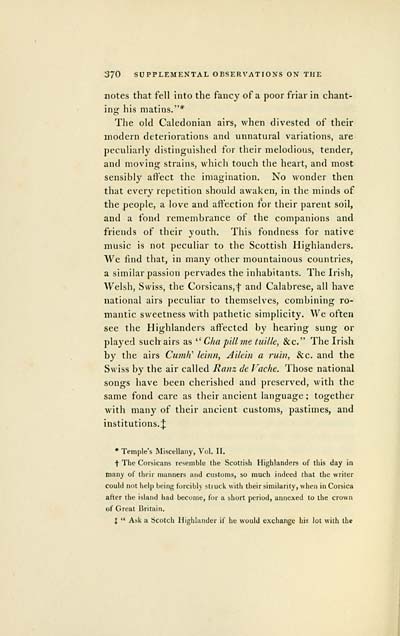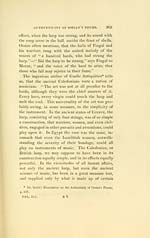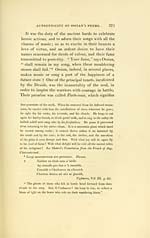J. F. Campbell Collection > Poems of Ossian > Volume 3
(382)
Download files
Complete book:
Individual page:
Thumbnail gallery: Grid view | List view

370 SUPPLEMENTAL OBSERVATIONS ON THE
notes that fell into the fancy of a poor fiiav in chant-
ing his matins."*
The old Caledonian airs, when divested of their
modern deteriorations and unnatural variations, are
peculiarly distinguished for their melodious, tender,
and moving strains, which touch the heart, and most
sensibly atìect the imagination. No wonder then
that every repetition should awaken, in the minds of
the people, a love and affection for their parent soil,
and a fond remembrance of the companions and
friends of their youth. This fondness for native
music is not peculiar to the Scottish Highlanders.
We find that, in many other mountainous countries,
a similar passion pervades the inhabitants. The Irish,
Welsh, Swiss, the Corsicans,f and Calabrese, all have
national airs pecuHar to themselves, combining ro-
mantic sweetness Avith pathetic simpHcity. We often
see the Highlanders aftected by hearing sung or
played suchairs as '■' Cha piUme tuille, &c." The Irish
by the airs Cumh' leinn, Ailein a rutn, &c. and the
Swiss by the air called Ranz de ì^ache. Those national
songs have been cherished and preserved, with the
same fond care as their ancient language ; togetlier
with many of their ancient customs, pastimes, and
institutions.;};
• Temple's Miscellaiiy, Vol. II.
t The Corsicans resemble the Scottish Highlanders of this day in
many of thcir maiiners aiid ciistoms, so much indced ihat thc writer
couid not lielp bciiig forcibly sti uck with tiieir similarity, whcn in Corsica
after the islaiid had become, for a short pcriod, annexed to the crown
of Great lìritaiii.
I " Asl( a Scotch liighlaiidcr if lic wouid c.xchange his iot wilh the
notes that fell into the fancy of a poor fiiav in chant-
ing his matins."*
The old Caledonian airs, when divested of their
modern deteriorations and unnatural variations, are
peculiarly distinguished for their melodious, tender,
and moving strains, which touch the heart, and most
sensibly atìect the imagination. No wonder then
that every repetition should awaken, in the minds of
the people, a love and affection for their parent soil,
and a fond remembrance of the companions and
friends of their youth. This fondness for native
music is not peculiar to the Scottish Highlanders.
We find that, in many other mountainous countries,
a similar passion pervades the inhabitants. The Irish,
Welsh, Swiss, the Corsicans,f and Calabrese, all have
national airs pecuHar to themselves, combining ro-
mantic sweetness Avith pathetic simpHcity. We often
see the Highlanders aftected by hearing sung or
played suchairs as '■' Cha piUme tuille, &c." The Irish
by the airs Cumh' leinn, Ailein a rutn, &c. and the
Swiss by the air called Ranz de ì^ache. Those national
songs have been cherished and preserved, with the
same fond care as their ancient language ; togetlier
with many of their ancient customs, pastimes, and
institutions.;};
• Temple's Miscellaiiy, Vol. II.
t The Corsicans resemble the Scottish Highlanders of this day in
many of thcir maiiners aiid ciistoms, so much indced ihat thc writer
couid not lielp bciiig forcibly sti uck with tiieir similarity, whcn in Corsica
after the islaiid had become, for a short pcriod, annexed to the crown
of Great lìritaiii.
I " Asl( a Scotch liighlaiidcr if lic wouid c.xchange his iot wilh the
Set display mode to: Large image | Transcription
Images and transcriptions on this page, including medium image downloads, may be used under the Creative Commons Attribution 4.0 International Licence unless otherwise stated. ![]()
| Early Gaelic Book Collections > J. F. Campbell Collection > Poems of Ossian > Volume 3 > (382) |
|---|
| Permanent URL | https://digital.nls.uk/81286336 |
|---|
| Description | Vol. III. |
|---|---|
| Shelfmark | Cam.1.b.5 |
| Additional NLS resources: | |
| Attribution and copyright: |
|
| Description | Volumes from a collection of 610 books rich in Highland folklore, Ossianic literature and other Celtic subjects. Many of the books annotated by John Francis Campbell of Islay, who assembled the collection. |
|---|
| Description | Selected items from five 'Special and Named Printed Collections'. Includes books in Gaelic and other Celtic languages, works about the Gaels, their languages, literature, culture and history. |
|---|

